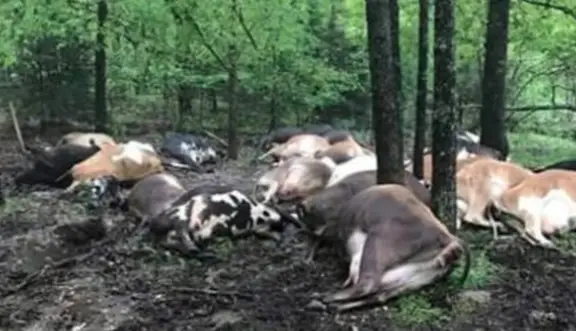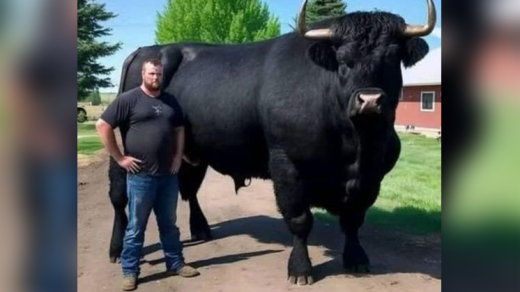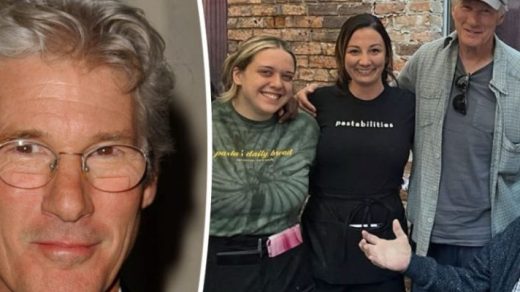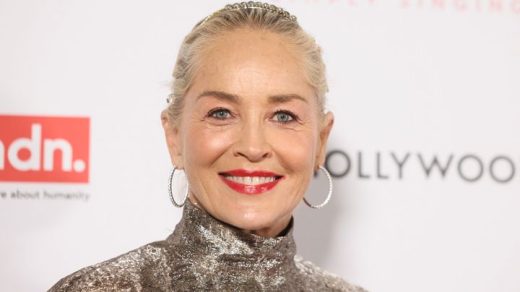In the heart of Missouri, a shocking and heartbreaking incident left a local farmer devastated. Jared Blackwelder, a dedicated dairy farmer from Springfield, experienced an unimaginable loss when he discovered 32 of his dairy cows dead in a single horrific scene. The cows, piled on top of one another in a pasture, had all perished, leaving Blackwelder in a state of disbelief.
This unfortunate event unfolded when Jared, who was accustomed to his routine of collecting the cows for their evening milking, returned to the pasture. The sight that greeted him was nothing short of a nightmare for any farmer. His entire herd of 32 cows had died, all clustered together as if seeking protection. Initially, Blackwelder couldn’t comprehend what had happened. However, as the initial shock subsided, the cause of the tragedy became clear: a powerful lightning strike had claimed the lives of his cows.
Nature’s Wrath: The Power of Lightning
Lightning strikes on livestock are not unheard of, though they are relatively rare. According to Stan Coday, president of the Wright County Missouri Farm Bureau, “[Blackwelder] went out to bring the cows in and that’s when he found them.” The sheer number of cows lost in this incident made it particularly devastating. Coday continued, explaining that “It’s a common occurrence. It does happen. The thing that made this the worst was just the sheer number of cows that were affected.”
Veterinary examination confirmed the initial suspicion—lightning had indeed struck the cows. They had likely gathered under a tree in an attempt to shelter from the storm, which ultimately proved fatal for the entire group. Tragically, animals seeking refuge during storms often unknowingly place themselves in harm’s way.
Coday reflected on the risks farmers face when dealing with forces beyond their control. “You’re at the mercy of mother nature,” he said. Coday himself had lost a cow to a similar incident years ago, understanding well the helplessness that Blackwelder must have felt.
The Emotional and Financial Toll
Losing a herd of cows is more than just a financial blow to a dairy farmer—it’s an emotional one. Farmers often build strong connections with their livestock. “It’s not like they are pets. But the ones I’m milking, I’ve raised every one of them,” Blackwelder shared with the Springfield News-Leader. He continued, “Dairy cattle are a little different because you mess with them twice a day. It knocks you hard.”
The loss of these cows not only breaks the bond Blackwelder had with them but also represents a severe financial loss. Each dairy cow is a significant investment, and the sudden death of 32 cows equated to a total loss of over $60,000. While Blackwelder had insurance, it was unclear if the payout would be enough to cover the damages.
Stan Coday provided some insight into the typical challenges farmers face when it comes to insurance. “Most producers don’t carry insurance,” he explained. “If you lose a cow you’ve lost everything.” In Missouri, where the weather tends to be mild, farmers often don’t have dedicated barns for their cattle. This decision, while practical in fair weather, leaves livestock vulnerable during unexpected storms.
The Aftermath: No Salvage Possible
As if the loss of life and financial strain weren’t enough, there was no way for Blackwelder to salvage any part of his cows for consumption. Due to the time that had elapsed since their death, the meat was no longer fit for human consumption. “Those animals are damaged and of course they had been there for a few hours when he found them,” Coday explained. “In processing an animal, there’s a process that needs to be gone through. They wouldn’t have been fit for human consumption.”
The impact of such a loss reverberates throughout the farming community, particularly in rural areas where livestock farming is a primary livelihood. Without proper barns or shelter, incidents like this, though rare, highlight the unpredictable nature of farming. Farmers, who are often deeply connected to their animals, face both the emotional and financial devastation that comes with such a tragic loss.
Lessons to Be Learned
This tragedy serves as a reminder of the unpredictable nature of agriculture. Farmers like Blackwelder work tirelessly to care for their livestock, but they are constantly at the mercy of natural forces. While there may be little to do in the face of a freak lightning strike, there are discussions within the farming community about the importance of weather-proof infrastructure. However, building dedicated barns and shelters for large herds of cattle comes at a significant cost, and many farmers, especially those with smaller operations, may not have the financial resources to invest in such measures.
Additionally, the unpredictability of insurance coverage adds another layer of complexity to an already precarious profession. While Blackwelder had insurance, many farmers do not, and even when they do, it may not fully cover the full extent of their losses.



